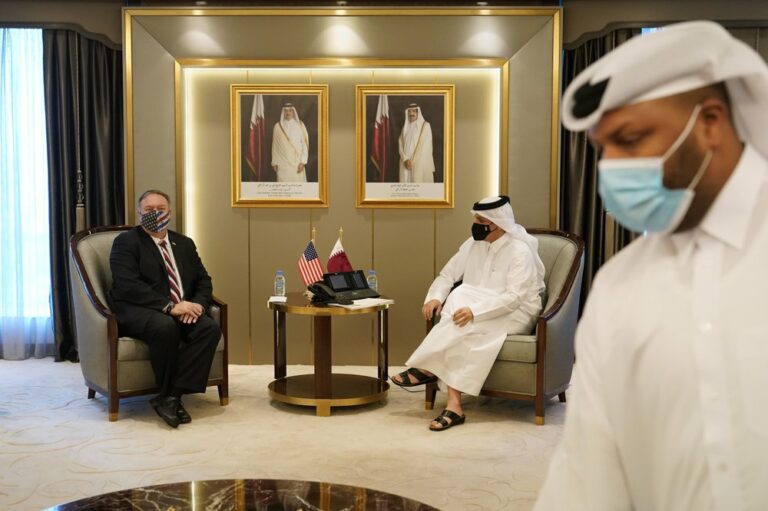U.S. Secretary of State Mike Pompeo on Sunday touted his tour of Gulf Arab states and the Trump administration’s continued efforts to squeeze Iran, even as a new U.S. administration led by Joe Biden prepares to enter the White House in January.
Although Pompeo has not taken questions from U.S.-based reporters traveling with him over the past 10 days, he sat down with the Saudi-owned broadcaster Al-Arabiya in Dubai for brief televised remarks Sunday.
“Our policies don’t change. Our duty doesn’t change. My responsibilities don’t change,” he said. “I still have an obligation — every hour, every minute — to defend the American people and to keep them foremost in our efforts, and we’ll do that. We’ll do that to the very last minute.”
In what was likely his final tour of the Persian Gulf as secretary of state, he touted the Trump administration’s Mideast strategy that focused on Iran as “the central threat inside the region” and for a maximum pressure campaign that hampered Iran’s ability to support militias in Iraq, Lebanon and Syria.
“It’ll be our policy until our time is complete,” he said, stopping short of saying when he’d cease work as the top U.S. diplomat.
The Trump administration is attempting to ramp up pressure on Iran before Biden takes office as president. Biden has said he wants to return to rapprochement with Iran. Analysts say Biden is expected to be more willing to engage the Iranians in order to avoid major escalation, although he’s likely to press Tehran on its missile program and not just its nuclear program.
Trump is viewed favorably by Gulf heavyweights Saudi Arabia and the United Arab Emirates for pulling the U.S out of a nuclear accord with Iran and reimposing sweeping sanctions that have drained Iran of vital oil revenue.
Pompeo is scheduled to travel to Saudi Arabia late Sunday to meet Crown Prince Mohammed bin Salman before heading back to Washington. His tour also included stops in France, Turkey and Israel, including an Israeli settlement in the occupied West Bank and a museum that honors Christian Zionists.
Trump was recently talked back from moving ahead with a military strike on Iran’s main nuclear site by advisors who included Pompeo, according to a New York Times report. When asked about this, a State Department official traveling with Pompeo told reporters that “all options are on the table” and that the Trump administration “will continue to pursue its policies until it’s not in office anymore.”
Pompeo started his Gulf tour in the UAE capital of Abu Dhabi early Saturday, meeting the emirate’s Crown Prince Mohammed bin Zayed, who’s seen as the day-to-day ruler and the powerful figure behind the country’s major policy decisions.
The State Department said they discussed the progress of the UAE’s decision to normalize ties with Israel — a move that was followed by Bahrain and Sudan. They also discussed “security cooperation and countering Iran’s malign influence in the region, as well as that of China,” the U.S. statement said.
Pompeo “also underscored the importance of Gulf unity.”
The UAE, Saudi Arabia, Bahrain and Egypt have largely balked at U.S. efforts to reconcile with Qatar, which they accuse of sponsoring terrorism and backing violent Islamist groups across the region. The quartet cut ties with Qatar in mid-2017 and have demanded the gas-rich Arab state shutter its flagship Al Jazeera news network among other demands, which Qatar has rejected outright, along with the accusations.
Pompeo departed Abu Dhabi for Qatar on Saturday, although there are no direct commercial flights due to the stalemate.
He had lunch with the ruler, Emir Tamim bin Hamad al-Thani, and met with Qatar’s foreign minister. The State Department said Pompeo discussed regional issues, and “the importance of a united Gulf to stand against the Iranian regime’s destabilizing activity, and the risk to the region presented by China.”
Qatar, however, has warm ties with Iran. The two countries also share a massive underwater gas field in the Persian Gulf.
While in Qatar, Pompeo additionally met with representatives of the Afghan government and Taliban, where the warring sides are holding talks about the future of the country. Despite a sharp rise in violence this year, Washington plans to withdraw an estimated 2,500 troops before the middle of January, leaving about 2,000 soldiers in Afghanistan.
(AP)











One Response
Pompeo’s audience for this lame-duck tour is Sheldon Adelson and other prospective Jewish donors to his planned presidential campaign. When he needs Evangelical Christian support, he will change his tune slightly. Remember, when the Jews get to The Promised Land, the Evangelicals will want us to accept their savior as ours, or die.